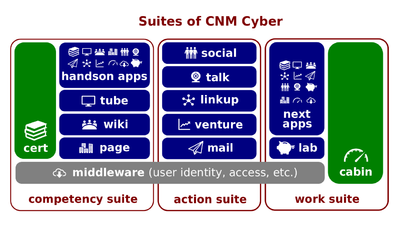Difference between revisions of "Federated vs Local Roles"
MariamKhalid (talk | contribs) (→Closing) |
MariamKhalid (talk | contribs) (→Closing) |
||
| Line 16: | Line 16: | ||
===Closing=== | ===Closing=== | ||
| + | :Would you be interested in exploring more about [[system user roles]] in [[CNM Cyber]]?---Yes/No/I'm not sure | ||
Revision as of 15:36, 22 October 2020
Federated vs Local Roles (hereinafter, the Lectio) is the lesson part of the Middleware Essentials lesson that introduces its participants to CNM Cabin. This lesson belongs to the CNM Cyber for Experience session of the CNM Cyber Orientation.
Content
The predecessor lectio is System-User Roles.
Script
- It is worth mentioning that WorldOpp Middleware manages its own system-user roles and every other service of CNM Cyber uses that role to allow that user to access its resources. WorldOpp Middleware's system-user roles are called federated.
- Going further, every service is supported by their own systems and those systems can manage their own local system-user roles. For instance, if WorldOpp Middleware identifies you and informs CNM Social that your federated role is CertUser, CNM Social checks its own database and clarify that you joined some communities and, possibly, assigns its local role. If the system's database assigns no local role, then the particular service takes your federated role by default.
- Nevertheless, throughout all services of CNM Cyber, only WorldOpp Middleware can identify you as you. No other service or system can do that; they rely on WorldOpp Middleware's determination.
Key terms
Closing
- Would you be interested in exploring more about system user roles in CNM Cyber?---Yes/No/I'm not sure
CNM Apps is the successor lectio.
